20 New Year’s resolution ideas that could make a real difference to your life
Try these New Year’s resolution ideas with a twist, to transform everything from your health to happiness in the coming months
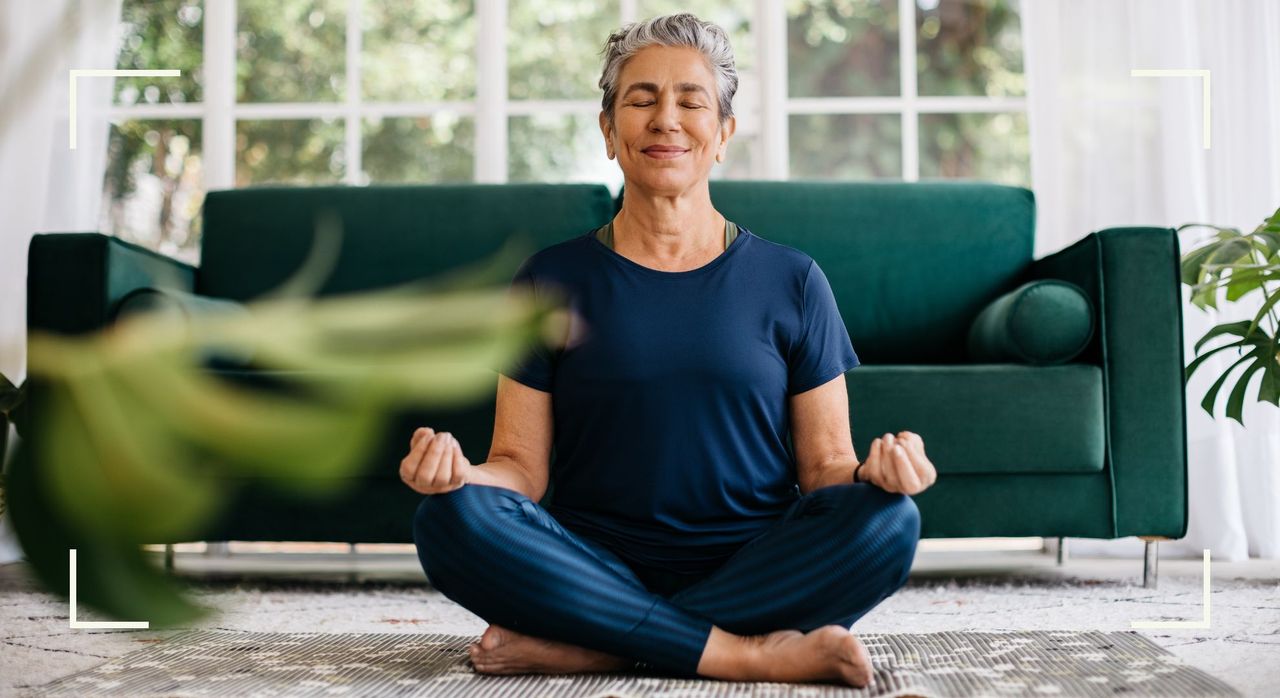

With the arrival of 2024, you're probably thinking about New Year’s resolution ideas to adopt. From changing your eating habits and giving up alcohol to going to the gym and drinking more water, many popular - and important - goals often get wheeled out with every fresh set of 12 months.
However, it's easy to forget that there are many other - perhaps smaller or a little out-of-the-box - resolutions that are just as worthy of our attention. Whether it's fitness, nutrition, mental wellbeing or another area of your life, there are many valuable tweaks we can make that make all the difference to our health and happiness.
At woman&home, we've called on the experts - from PTs and life coaches to nutritionists and psychologists - to share inspirational suggestions for resolutions that you can aim for in the coming year. They also reveal what makes an ideal goal to pursue, how to make New Year's resolutions that last, and their best tips for ensuring you succeed in the long term.
New Year’s resolution ideas
1. Spend more time alone
"One of the main New Year's resolution ideas I would recommend is to prioritise time by yourself," says Dr Sandi Mann, senior psychology lecturer at the University of Central Lancashire. "Spending periods alone, where you are not having to perform or present yourself in front of others, can have a positive impact on your wellbeing."
Indeed, learning how to be happy alone can help you reduce stress from unwanted social situations and weed out negative relationships in your life, creating the space and time for more positive ones in the future.
What might this alone time look like? "Perhaps carving out time to exercise," explains Dr Mann. "You could also do something creative, or find a hobby that you enjoy, but it's also good to clear space to sit in boredom and let your mind wander. Making a conscious effort to get away from your phone and other distractions, such as by going for a walk, can allow you to daydream."
2. Do daily yoga
If you are looking to make a fitness-related resolution in 2024, the experts have some key advice. "So often, people set very extreme targets that quickly become unsustainable, leading to feelings of failure," explains Nancy Best, personal trainer and founder of Ladies Who Crunch. "January is actually quite a hard month to maintain motivation, given it’s cold and dark in the UK [and many people don't like to work out in cold weather], so don’t expect yourself to jump out of bed at 6 am ready to go on a run."
Sign up for the woman&home newsletter
Sign up to our free daily email for the latest royal and entertainment news, interesting opinion, expert advice on styling and beauty trends, and no-nonsense guides to the health and wellness questions you want answered.
On that note, Best encourages you to only set fitness-related resolutions that are realistic. "My advice is to focus on how something makes you feel, rather than the aesthetic results," she says. "Perhaps you want to feel more energised, or calm anxious thoughts? Set a goal to complete ten minutes of yoga every day. Success consists of all the micro-decisions, habits and behaviours that surround achieving your aim."
Downloading one of the best yoga apps can help you with this goal. Whether you're looking to improve your strength with power yoga or flow into a relaxing session to start the day, one of these should have you covered with both free and paid versions available.
3. Run a 5k
As Best says, it's better to look for smaller, achievable New Year’s resolution ideas with your fitness goals and stick to them, rather than creating big plans that don't have much chance of success. If daily exercise isn't a realistic goal for you, then doing something a couple of times a month could be a good place to start.
Caroline Idiens, personal trainer and founder of Caroline’s Circuits, agrees. "For example, sign up to a local 5km run and aim to attend two of these each month instead of committing to weekly attendance or signing straight up to a half marathon," she says. Park Run is a community event that happens every Saturday morning in most major green spaces around the UK, offering attendees the opportunity to walk, run, or jog a 5km distance with zero time pressure.
"Whatever your resolution, keep the steps towards it small, and you’ll be surprised at how easy it is to keep to it. Over time, however, the progress will feel huge. If you’re a beginner in the gym, why not start by holding a plank for ten seconds before building up to a minute, then on to two before trialling a class?"

4. Try a new form of exercise
Finding the motivation to work out is by no means an easy task, so, if you don't have one already, it's essential to find an exercise you genuinely enjoy. Get yourself excited to lace up your pick of the best running shoes by adding variety to your routine and trying something new.
"Try something new and community-focused when it comes to fitness," suggests Katie Knowles, partner and trainer at the Knowlesy Academy. "For example, Muay Thai is brilliant for not only providing you with a full-body workout and boosted fitness levels, but you will also be learning a new skill and developing mental toughness at the same time."
Knowles adds that doing group exercise is also great for workout motivation. "Engaging in a community will hold you accountable and provide the encouragement to see your resolutions through," she explains, noting that another key way to achieve movement goals is to create a consistent training schedule that you can stick to.
5. Consume more fibre
Much like with exercise, totally overhauling your eating habits can be unsustainable and lead to disappointment down the line. Instead, Jenna Hope, a registered nutritionist and author of the book How To Stay Healthy, says the best nutrition New Year’s resolution ideas can be sustained in the long term.
"The most successful approaches are often ones which are done at a slower pace," she says. "Look at your diet to see what small changes you can make that are enjoyable, non-restrictive and celebrate healthy, nourishing whole foods."
That includes adding foods onto your plate rather than removing them. "Getting more fibre into your diet is always a great focus," suggests Hope. "This could be as simple as sprinkling seeds onto your toast."
She recommends consuming up to 30g a day of fibre for optimum health - important for everything from digestive health to cholesterol levels. Wondering how to get more fibre in your diet? It can be found in foods such as fruits, vegetables, grains and legumes.
6. Consume less caffeine
Lowering your intake or cutting out caffeine completely is another great example of a small change you can incorporate into better daily health habits, says Jennifer Walpole, a registered nutritional therapist. "Many of us use it as a crutch to keep going when the afternoon slump hits, but it may be impacting your quality of sleep more than you think," she says.
Walpole suggests finding alternatives to caffeine if you love the ritual of a caffeinated beverage after lunchtime. She says, "Try switching to a Swiss Water decaf coffee, which is a 'cleaner' method of decaffeination. Otherwise, matcha or green tea can be nice options, both of which have much less caffeine coupled with the calming effects of L-theanine and additional antioxidant properties."
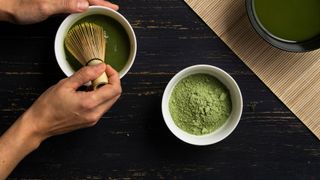
Matcha can be a great way to slowly reduce your caffeine intake if better sleep is your top New year's resolution idea for 2024.
7. Establish healthier boundaries
If you were left frazzled by the time life wrapped up for the festive season, then chances are you need to start the new year prioritising yourself more. As well as spending time by yourself, establishing healthy boundaries in personal and professional relationships can be hugely beneficial to your mental health.
"It can help to ward off the early signs of burnout, reduce stress and improve overall mental wellbeing," says Dr Tom MacLaren, consultant psychiatrist at Re:Cognition Health.
How to add self-care into your life? "It can include taking regular breaks throughout the day, getting six to eight hours of quality sleep every night, exercising daily, engaging in hobbies and activities that bring you joy and committing to socialising with friends and loved ones regularly," he says. "Additionally, foster healthy relationships by surrounding yourself with supportive and positive people who inspire and lift you."
8. Stretch before you go to sleep every night
If you're used to simply jumping into bed, and then wondering why you can't nod off, it could be worth adding some bedtime yoga into your routine as one of your New Year’s resolution ideas. "Start stretching before you go to sleep," suggests David Wiener, a training specialist at Freeletics."This should be something you do every single night as it will help relax you."
However, it's not just your sleep quality that could benefit. "Regular stretching can also help your body to become more flexible and aid the recovery of your muscles after workouts," he adds. Stay comfortable as you move by using one of the best yoga mats and if you're not sure where to start with a daily stretching routine, having one of the best stretching apps can help out.
9. Eat the rainbow
Want to expand your palette and get more vitamins into your diet in the new year? "Try to incorporate a rainbow of fruit and vegetables into each meal," advises Kim Plaza, nutritionist at Bio-Kult. "It doesn’t need to be elaborate, just a spoonful of berries at breakfast or a few green leaves with dinner." She notes that not only will the bright colours boost your motivation for healthy eating, but they will also increase fibre consumption, making them some of the best gut-healthy foods as well.
It's likewise a great opportunity to rustle up more sustainable meals. "Eating seasonally provides us with the nutrients that match the time of year," adds Plaza. "For example, orange and yellow vegetables that are abundant throughout winter provide us with vitamin A, which is important for immunity and good barrier function for our digestive system."

10. Limiting technology to certain hours of the day
We can all get a little wrapped up in social media but doing a digital detox in the evenings and keeping screen use to certain hours of the day can make all the difference, says Nichola Henderson, a self-development coach, who is also a yoga, meditation and breathwork teacher.
Even the busiest among us can get sucked into a late-night scroll, so resist temptation by taking it out of reach. "For example, set limits on social media apps - and remember they are designed to keep you on there. Being constantly ‘on’ is draining for your energy, so protecting yourself by implementing boundaries with your devices will help you find balance."
11. Find a new challenge
One of the core things that will help you stick to a new fitness routine is making it fun. "Challenge yourself," says Haylene Ryan-Causer, a personal trainer and the co-founder of Café Volonté. "Perhaps it's a group one - such as you and your friends or colleagues all aiming to walk a million steps in six weeks, using a fitness app like Strava so you can follow each other's progress and stay accountable."
This can also be a great opportunity to add more variety to your workout schedule. If you tend to train in the same way all the time, then make a concerted effort to mix things up. "Do 10 sessions of a new class - such as HIIT, yoga, Pilates, weightlifting or boxing," she suggests. "Committing to a block of sessions will give you a more meaningful experience, as well as enough opportunity to develop the required skill or technique."
If exercise out of the gym is more your style, what about signing up for an event? Run Through UK offers running events from 5km to ultra-marathons, suitable for every fitness level - even those looking to learn how to start running as a beginner.
12. Drink less alcohol
One of the New Year’s resolution ideas that was brought up by the experts time and time again was learning how to cut down on alcohol in 2024. While many people take up bold resolutions after the boozy festive period - such as Dry January - but this can be an unsustainable approach, requiring you to pivot your lifestyle overnight. There's also little evidence that these initiatives work to curb alcohol consumption in the long term, unfortunately.
Instead, the experts suggest looking at your alcohol consumption for the year. Instead of finding out what happens when you give up alcohol for a month, why not see the benefits of not drinking alcohol or drinking less over 12 months?
Per research by Seoul National University along with many others, reducing your alcohol intake can lead to several health benefits - including sustainable weight loss, better cognitive function, improved gut health, and it can reduce the risk of several life-threatening diseases, such as heart disease and cancer.
Needless to say, the lack of headaches, fatigue, nausea, and the dreaded 'hangxiety' will make you feel more productive and in a better headspace pretty quickly.

One of the best alternatives to alcohol is kombucha. It's a refreshingly light drink that still packs a punch, so you don't feel like you're drinking juice. It's also great for your gut health, with all the good bacteria needed to keep things running smoothly.
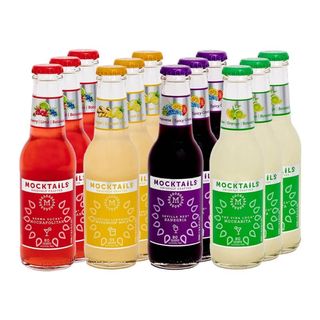
Available to buy on Amazon, these Mocktails come in all kinds of flavors so you don't have to compromise on your favorite flavors. Includes popular drinks like Mockscow Mule, Mockarita, Mockapolitan, and Sansgria.

Sitting among the best low-calorie non-alcoholic drinks in a can is Lucky Saint - available as a lager or IPA. Not everyone likes beer and non-alcoholic versions of classic tipples won't be for everyone but if it is for you, once you taste this one, you won't be surprised to know it's won multiple awards for taste and quality.

13. Crack that five-a-day
It's the nutrition goal we all know about but it's one not all of us are achieving. If you found yourself feeling under the weather, struck down with colds last year more often than normal, consider eating more foods high in vitamin C and nutrient-rich fruits and vegetables.
"Fruit and vegetables are a great source of vitamins, minerals and fibre, which can help you maintain a healthy gut and prevent digestion problems," explains Jess Hillard, nutritionist at Warrior. "They are essential to a healthy, balanced diet and can help you stay top of your game, so it’s a great resolution for everyone to strive towards."
How can you meet your five-a-day once and for all? "Be more mindful about food, and get clued-up on all the produce that can contribute," suggests Hillard. "For example, fresh, frozen, dried and canned fruit and vegetables all count towards it, making it easier to reach your goal without having to buy an abundance of fresh fruit which can be expensive and quickly perish." It's worth noting that a portion of fruit or vegetables is 80g, according to NHS guidelines.
14. Be more mindful
The practice of mindfulness is the ability to be fully present, aware of where we are and what we're doing, and it has been found to reduce anxiety as well as stress. "It is one of the easiest things to incorporate into your life when you know how," says Henderson. "It's about slowing down, enjoying the things you are doing in the moment, not always thinking about the future and what’s next."
She adds that it’s a skill that needs to be cultivated and it's not something that always comes easy to everyone, but is one that can enrich the quality of your life.
Tied into this is being mindful of how you speak to yourself. "Listen to your thoughts, become aware of how you speak to yourself and challenge that critical voice," advises Henderson. "Try to use more compassionate language and understanding in tough times." For example, you can use the powers of positive self-talk to boost body confidence and generally learn how to be more confident.
15. Spend time outdoors
One of the easiest New Year's resolution ideas is to simply walk out your front door a little more often. "Spend more time outside," suggests Plaza. "It is beneficial for so many aspects of our wellbeing, including cognitive, hormonal, sleep, mood and immune health. Our bodies react to daylight through receptors in our eyes, which is how it can influence a whole range of body systems."
What counts? "Whether it’s a walk after lunch in the winter sun, cleaning the windows, or the first spot of gardening in the new year, there are so many ways to get yourself outside," adds Plaza. "What's more, this is one resolution that's free, doesn't require any special equipment and needn't have you committing a lot of time." You can also simultaneously make the most of many of the other benefits of nature.

16. Be more sociable
According to a 2021 survey, the average adult has between three and five close friends. 2024 might be the year to change this and learn how to make friends as an adult as one of your New Year’s resolution ideas. Research by the University of North Carolina and Northern Illinois University has found that those who have six or more friends tend to be healthier, while women between 40 and 60 who have three or more friends also tend to have higher levels of overall life satisfaction.
"Expand your social network," suggests Plaza. "This may feel a little daunting at first, particularly during the colder and darker months when we may feel more reflective and enjoy the quiet. However, social connectedness is linked with improved rates of depressive symptoms, anxiety and physical activity."
She adds: "Some studies have even found that it helps with self-worth, optimism about life and increased positive changes in health behaviour."
Not sure where to begin? "Have a look at some local groups that pique your interest, and try to match them with things that you like doing - such as walking groups, book clubs or gardening," recommends Plaza, pointing to some of the new hobbies you could try. "But there’s also a case for trying something completely new. Some libraries offer a range of activity groups, as well as community centres. If there aren’t any available, you could look to organise one?"
17. Start meditating
If meditating is a practice that you're convinced you are too busy to incorporate into your day, but you want to find a new way to destress, then try it little and often. "Micro meditations can help you de-stress, fight overwhelm and clear your mind," explains Nicci Roscoe, life coach and author of the book Manifest Your Everything. "They help you relax and give you energy and clarity to mentally cope with any issues you may have in that moment."
How does it work? "You may not have time to meditate for even five, ten or 20 minutes, but it's amazing how much one or two minutes can help refresh your mind," notes Roscoe. "Sit or lie on your bed or the sofa, and set your phone alarm for however long you can spare. Close your eyes, and take a slow deep breath in through your nose and out through your mouth. Repeat three times, and then find a comfortable normal breath for you to meditate. When the alarm goes take a deep breath in and feel the difference." Want further guidance? Try one of the best meditation apps.
18. Get more steps in every day
Increasing your step count is a simple fitness goal that doesn't involve any real-time investment, any gym or studio memberships, and no equipment. Although, if you're looking to go walking in the great outdoors, it's best to invest in a pair of the best walking shoes.
It can also be one of the most useful ways to gradually improve your physical wellbeing. Indeed, increasing the number of steps you do per day can have a huge positive impact on your overall health. A study by Brigham and Women's Hospital found that women who reached 4,400 steps a day reduced their risk of premature death by about 40%, compared to those who took 2,700 or fewer steps per day. You can monitor your progress with one of the best fitness trackers.
"I would suggest readjusting your routine by getting up slightly earlier to fit in a 20 to 30-minute walk around your local area," suggests Kirstie Lucas, personal trainer at F45 High Street Kensington. "It will make a huge difference to your step count."
19. Become more organised
If things have felt a little chaotic during the past 12 months, perhaps it's worth trying to attract better order in your life. "Get more organised all year round," suggests Roscoe. "For example, create a filing system so that you can store bills carefully away each time you open the post. Empty your bags or pockets of receipts that you need to keep regularly, and store them in the appropriate file - perhaps under 'clothes' or 'travel expenses'."
As for day-to-day life, one of the best time management apps can help you keep track of your schedule and those of others in your household.
While bringing in a more organised approach to life may seem like one of the duller New Year's resolution ideas, it will help you deal with stress and allow you the headspace to concentrate on the more fun things in life. This could also herald in a good opportunity to declutter your home and make the most of some of the best home organisation ideas, including implementing a labelling system and upgrading your storage.
20. Relax with writing
If you want to focus on your mental health as one of your New Year’s resolution ideas in the coming months, try and find a release in a creative outlet like writing. "Journaling, creative writing or other forms of written expression can have a supportive impact on your wellbeing," notes psychotherapist Eloise Skinner. "If you feel like you have a lot on your mind, or if you feel overwhelmed by a decision or process, grab a pen."
You can do this in a planner or if you'd rather avoid the risk of prying eyes, in one of the best journaling apps.
For another tool to calm your thoughts, try the medium of audio. The best podcasts for anxiety can help soothe your mind while doing a running meditation is a great way to shift into a more positive headspace. Not least because pounding the pavements will trigger the release of endorphins (feel-good neurotransmitters).

What makes a good New Year’s resolution?
"They can be anything you want them to be," explains Jade Thomas, psychotherapist and founder of Luxe Psychology Practice. "But a good place to start is asking yourself where you want to be in a year. How do you want to feel? What do you want to achieve? Sometimes it can be helpful to separate resolutions into categories - such as personal, professional, financial and health - as this can give you clarity on the areas you wish to improve in your life."
The main thing is that your goal is achievable. "It is great that you want to make big, positive changes but ensure that it's possible within the next 365 days," notes Thomas. "Because when we 'fail' at sticking to resolutions, it simply reduces our confidence and motivation to continue." To be realistic, she suggests focusing on between one and three New Year’s resolution ideas for the year.
Whatever you choose, it needs to be meaningful with a positive impact on your life. "This can include things like quitting smoking," says psychologist Dr Alison McClymont. "But you need to think more specifically - how exactly has smoking been holding you back? How will giving up will bring enjoyment when you achieve it? Generic goals will invariably disappear into the intangible."
Dr McClymont continues: "The key is to make it personal. Write down a mind map of how this will change your life - perhaps your family, your health and maybe even your career. Explore every possible avenue of improvement and consider what it means, rather than just 'this is a goal I should have'. Summarise this statement into a simple sentence: 'I want to quit smoking for…." You can do this on paper or perhaps in one of the best productivity planners.
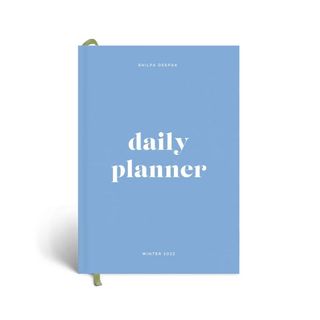
Papier’s Daily Planner ticks all the boxes when it comes to a planner encouraging productivity while also including sufficient space to see weeks and months in advance. Each week begins with three weekly overview pages, which include a diary-style layout to write down plans, meetings, and any other important scheduled items for the week ahead. It also comes in a variety of exciting colours.
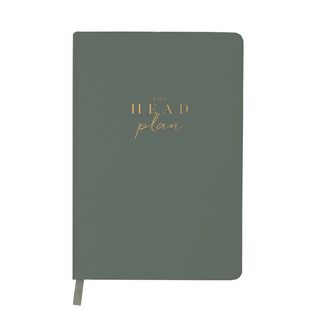
The Head Plan’s planner focuses on so-called SMART goals - i.e. goals that are specific, measurable, achievable, realistic, and timely. As well as tracking habits, any books you’re reading and other plans and meetings on the ‘monthly glance’ pages, at the end of each week, there’s also a page to reflect on how well it’s all gone.

This undated planner from Martha Brook allows you to input your own dates and schedules, meaning there’s no pressure to fill out all of the twelve months included. If you don’t use the planner for a few weeks or a month, there won’t be an awkward-looking gap in the middle as you can just jump back in where you finished off. Perfect for those looking to go back to paper planners after making a change to digital calendars in recent years.
Tips for sticking to your resolutions
- Prepare in advance: "An action plan of how you will achieve your New Year’s resolution ideas not only makes them seem more manageable but also ensures your resolutions are realistic, specific and achievable to avoid any feelings of disappointment or impact on your motivation," says Thomas.
- Consider your motivation: "Asking yourself why you want to do something and what the benefits might be can help you to stick to your goals," says Dr Mann. Is it to enhance your health? Fulfill a dream? Boost your social life?
- Keep goals forefront: "This means we need to continually remind ourselves why we have them," notes Dr Mann. "It might be useful to put some notes up on your wall, such as the key advantages to keeping your resolution or the costs of not keeping them."
- Track your progress: "Break down your long-term goals into short-term chunks and reward yourself for each milestone achieved," suggests Dr MacLaren.
- Ease off self-pressure: "Strive for consistency rather than perfection," advises Dr MacLaren. "If you maintain your resolutions 80% of the time you are winning - don’t give up if you stumble at the first hurdle. Get back up and keep going."
- Give it time: "It takes 66 days to change behaviours and make a new habit, and it takes six months for it to be embedded into your personality – it doesn't happen overnight," points out Dr MacLaren. "Consider using a calendar to mark off days you have achieved your goals so you can see the positive shift."
- Change your mind: "New Year’s resolution ideas don’t have to be fixed," insists Henderson. "They can be moulded, changed, built upon or completely fresh. Knowing that they start as an intention, and then you’ll be open to what happens means that in the long term you are more likely to succeed."

Lauren is a freelance writer and editor with a decade of print and digital journalism experience. While she specialises in covering health and wellness topics - ranging from nutrition and fitness, to women’s health conditions and mental wellbeing - she has written across a diverse range of lifestyle topics, including fashion, beauty, interiors and travel.
In addition to writing for Woman & Home and sister title Homes & Gardens, Lauren's work has also been published by Women’s Health, The Times, Daily Telegraph, Elle, Cosmopolitan, The Guardian, Marie Claire, Body + Soul, Stylist, Glamour, Grazia, Red, Dazed Digital, Yahoo Life, The Sun’s Fabulous, Get The Gloss and Hello! among others.
-
 Sienna Miller's best hair and makeup moments from across the years
Sienna Miller's best hair and makeup moments from across the yearsWe revisit some of her top beauty looks from the archives...
By Lucy Abbersteen Published
-
 Katie Holmes broke an unspoken fashion rule in tights and mules - her shoes are available for less than £100 on Amazon
Katie Holmes broke an unspoken fashion rule in tights and mules - her shoes are available for less than £100 on AmazonThe statement gold kitten heels are a surprisingly versatile spring staple
By Charlie Elizabeth Culverhouse Published